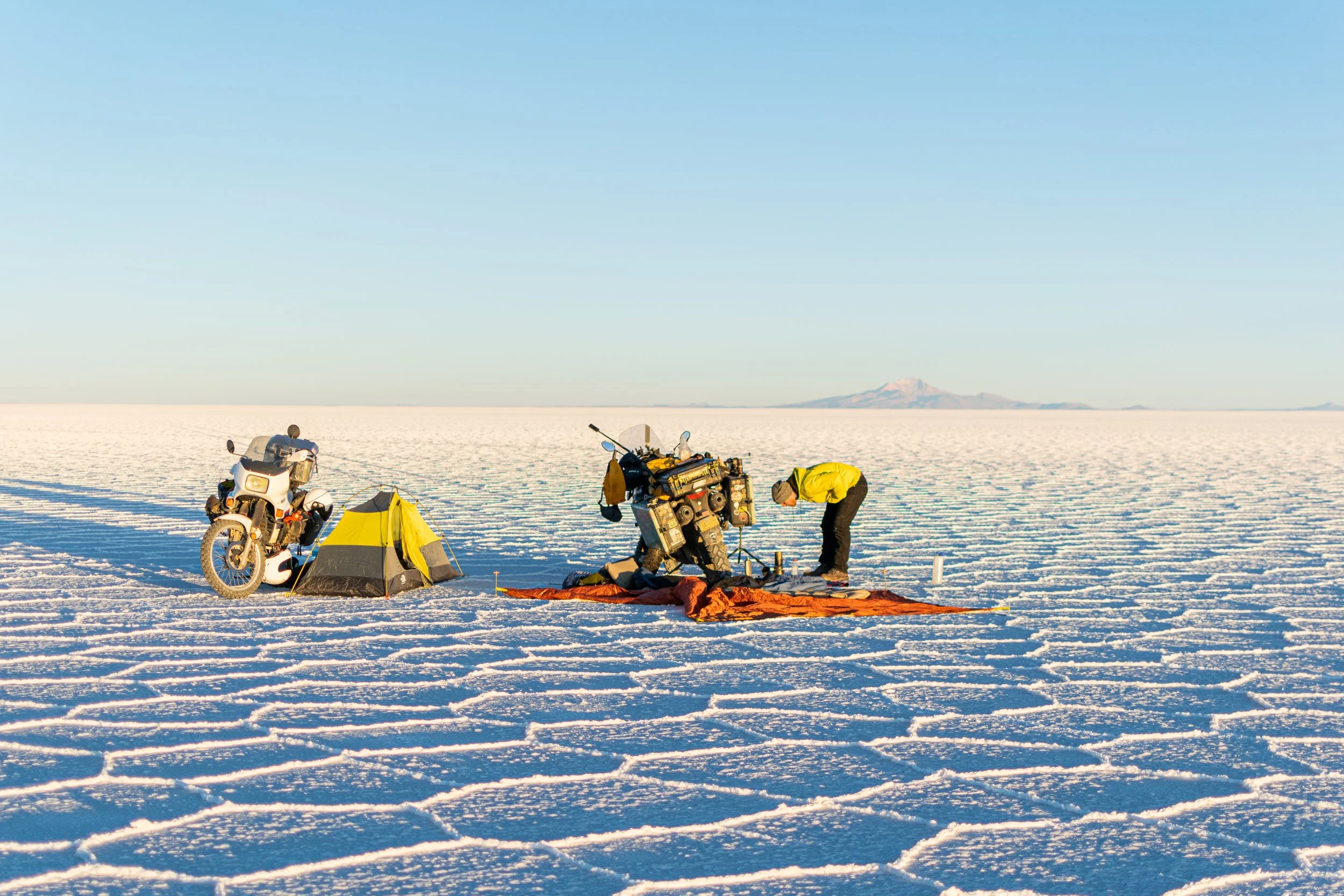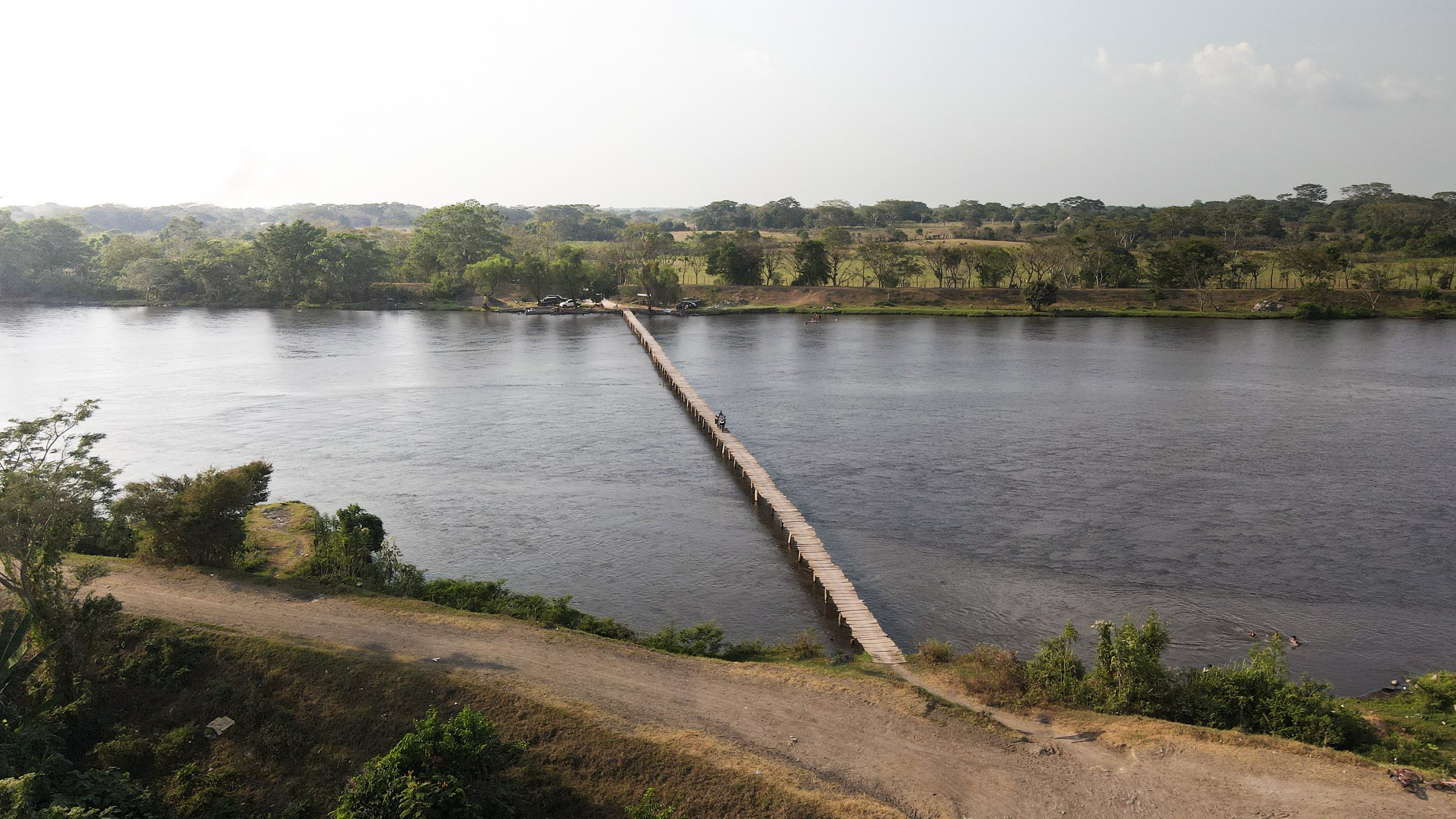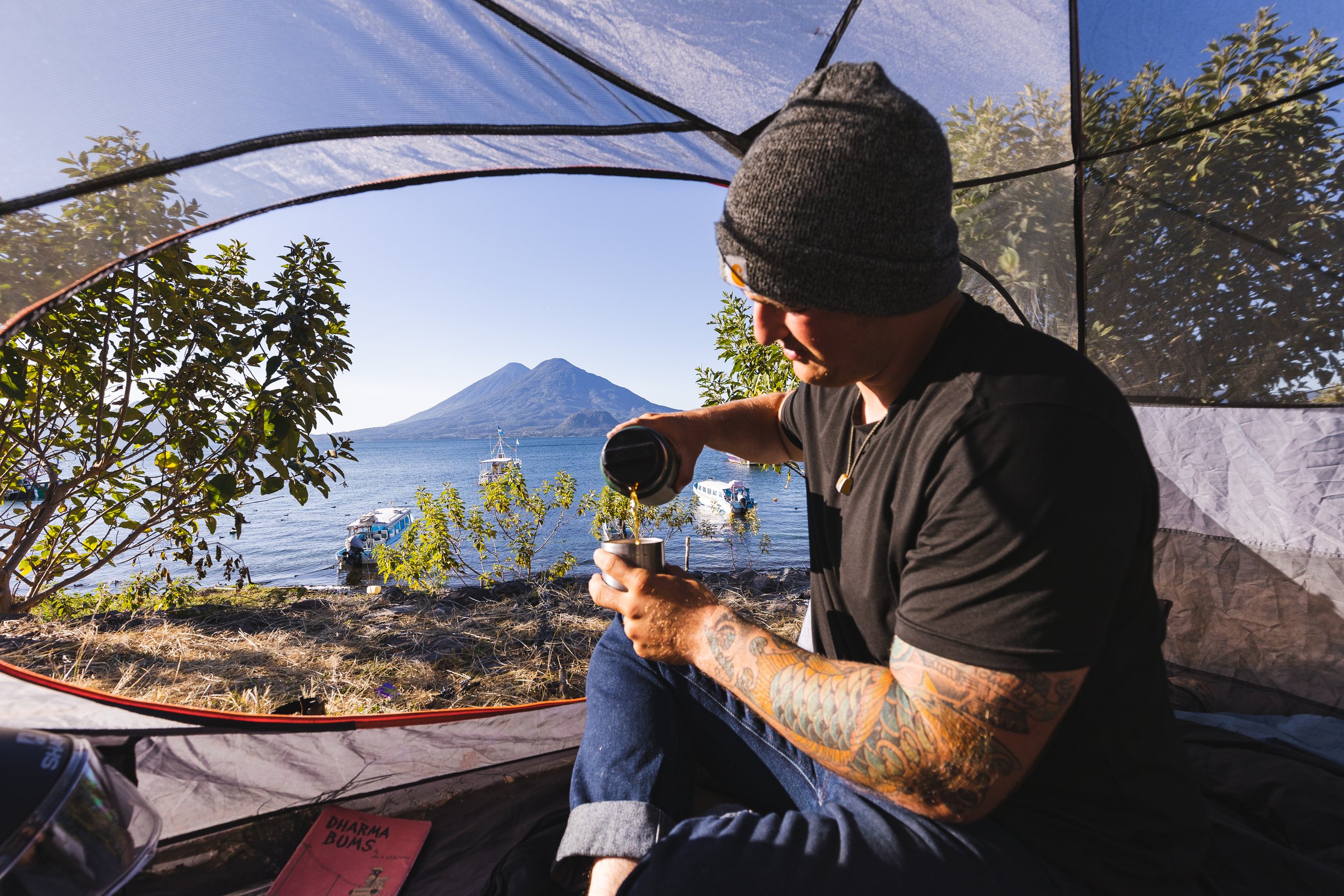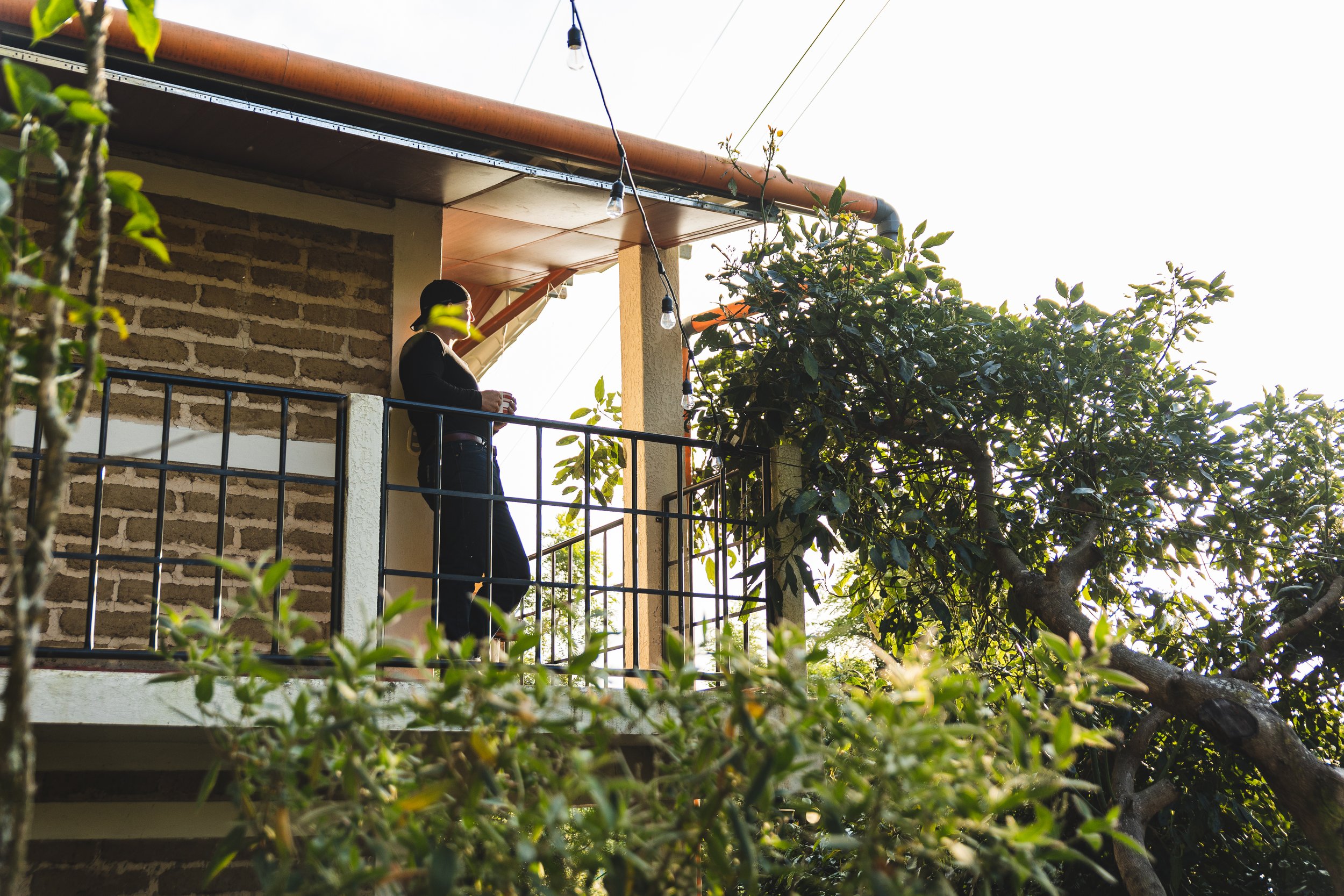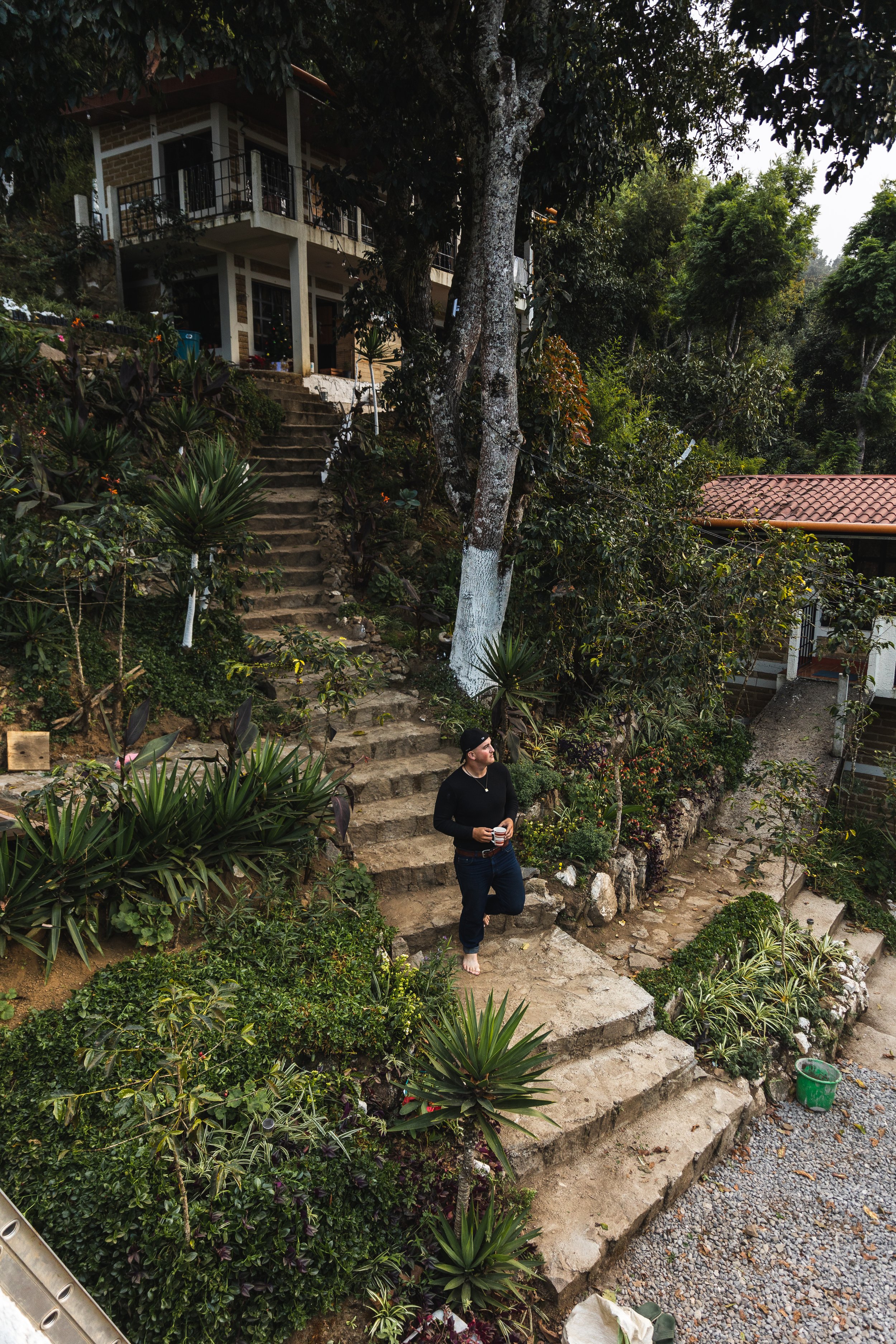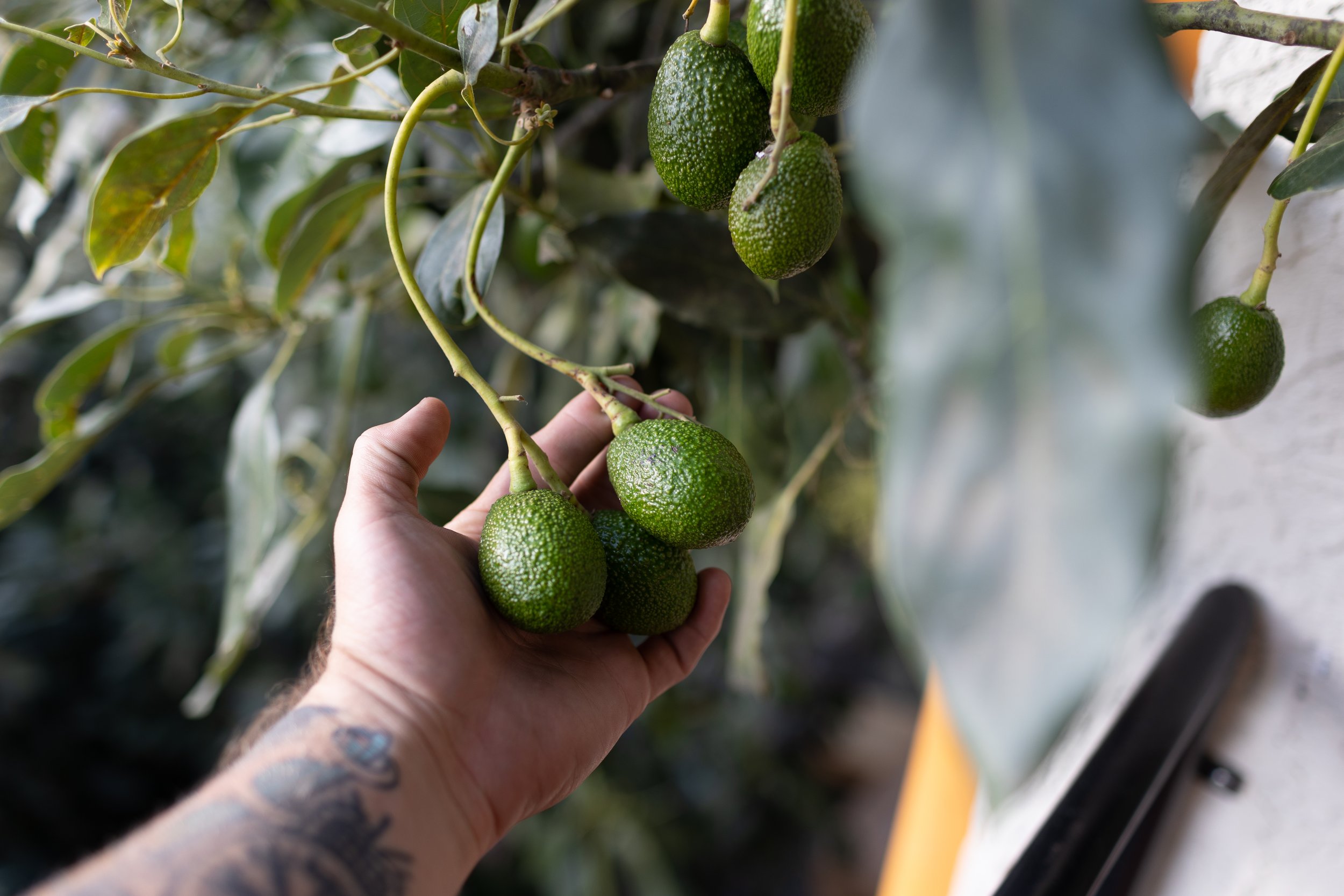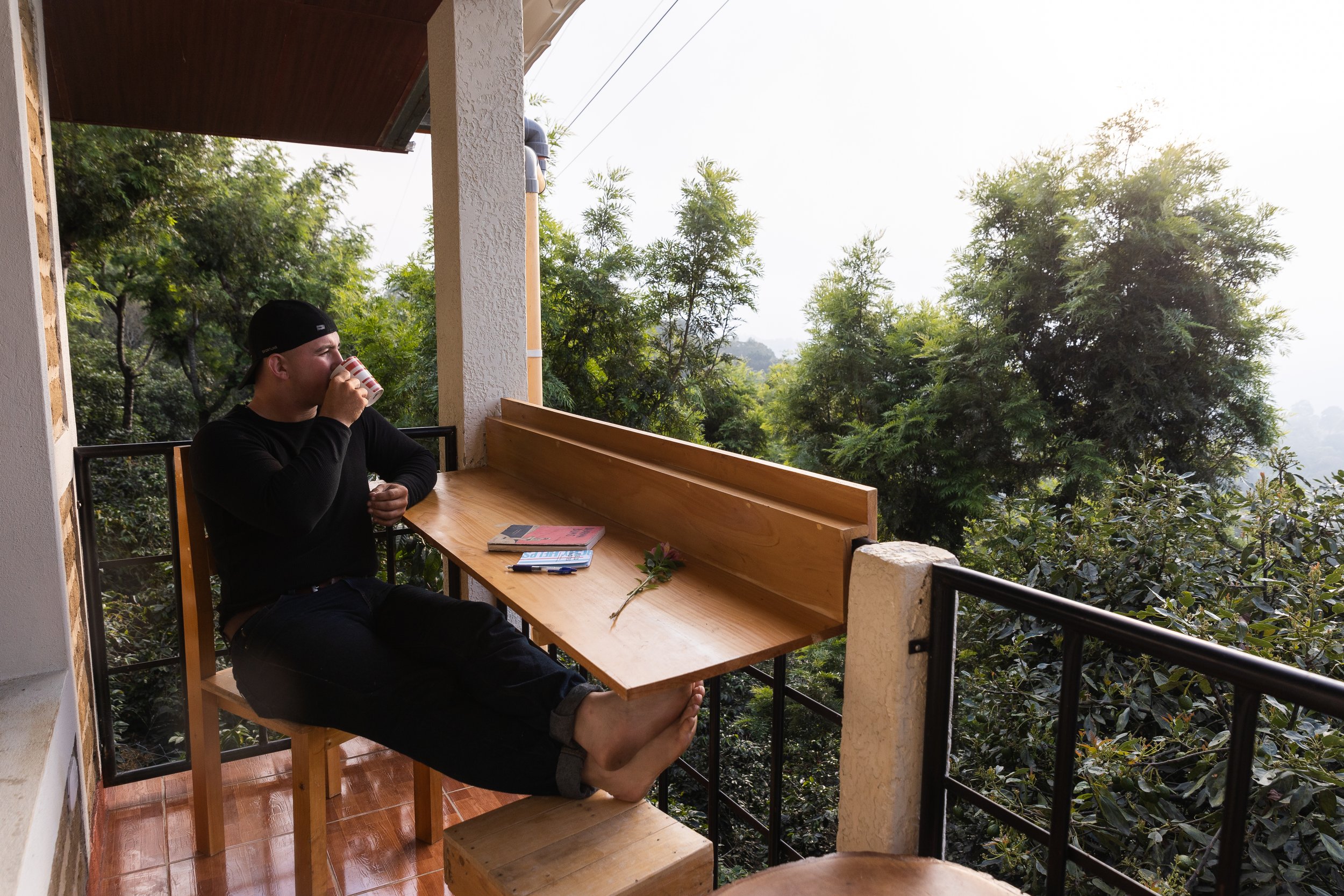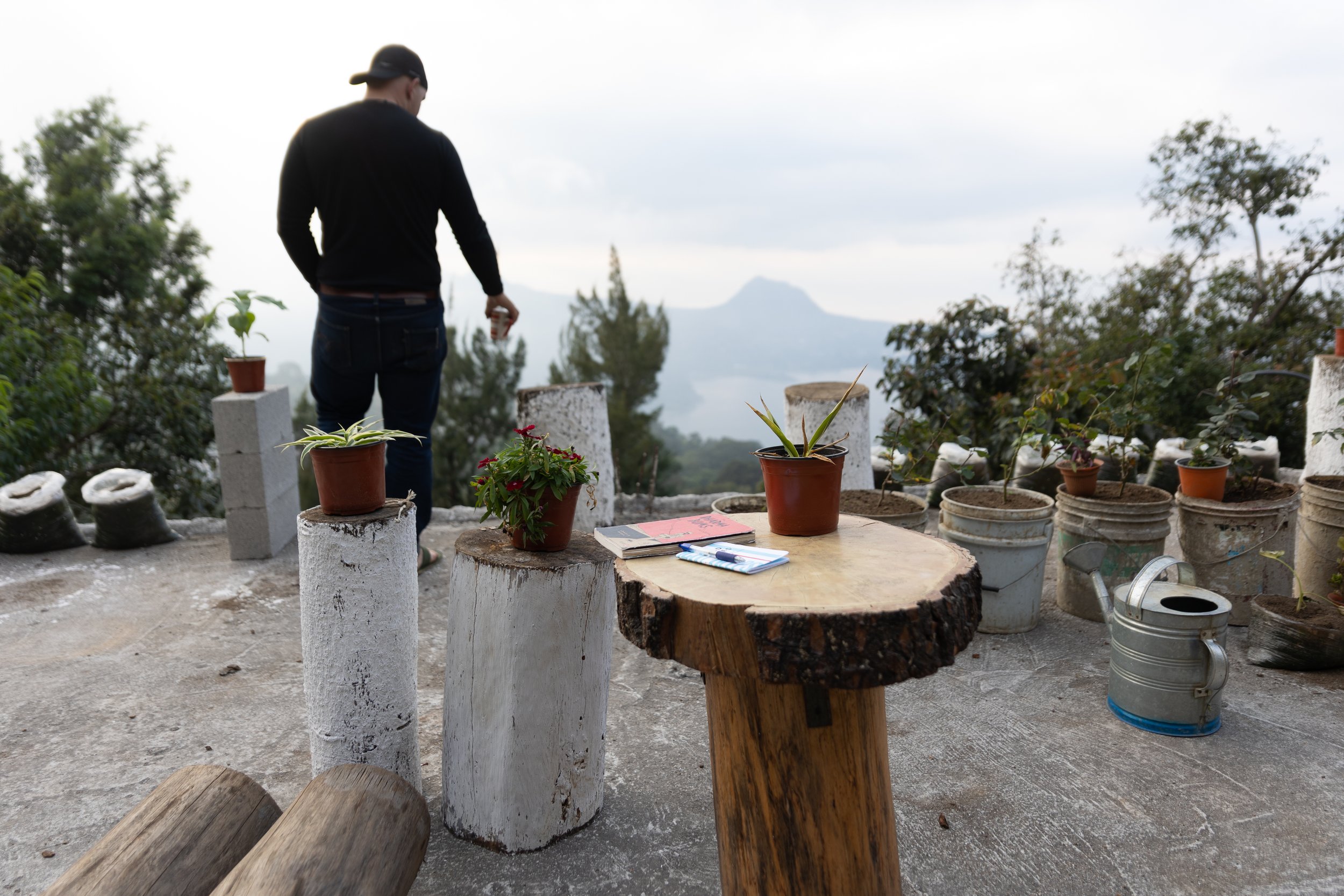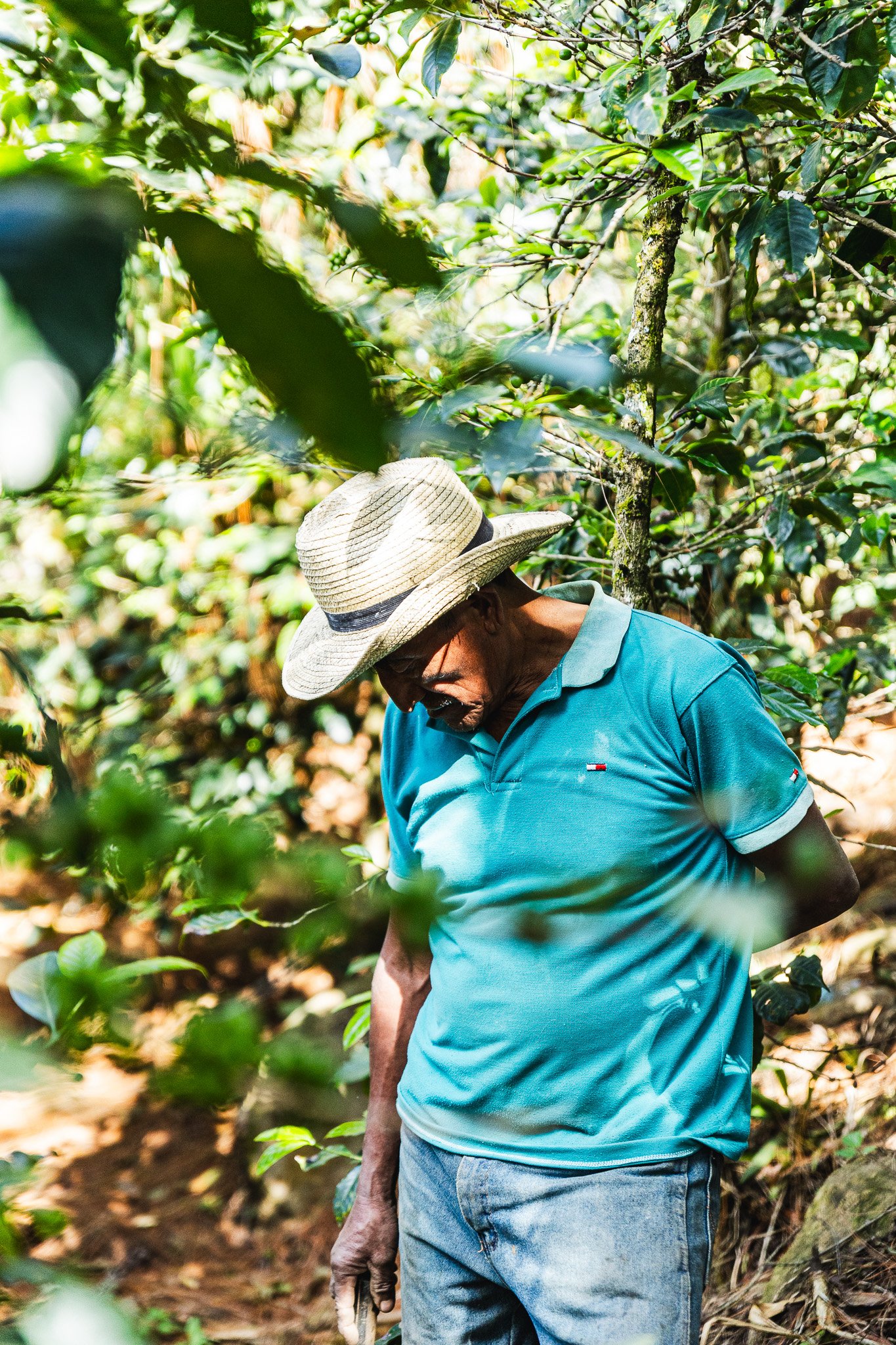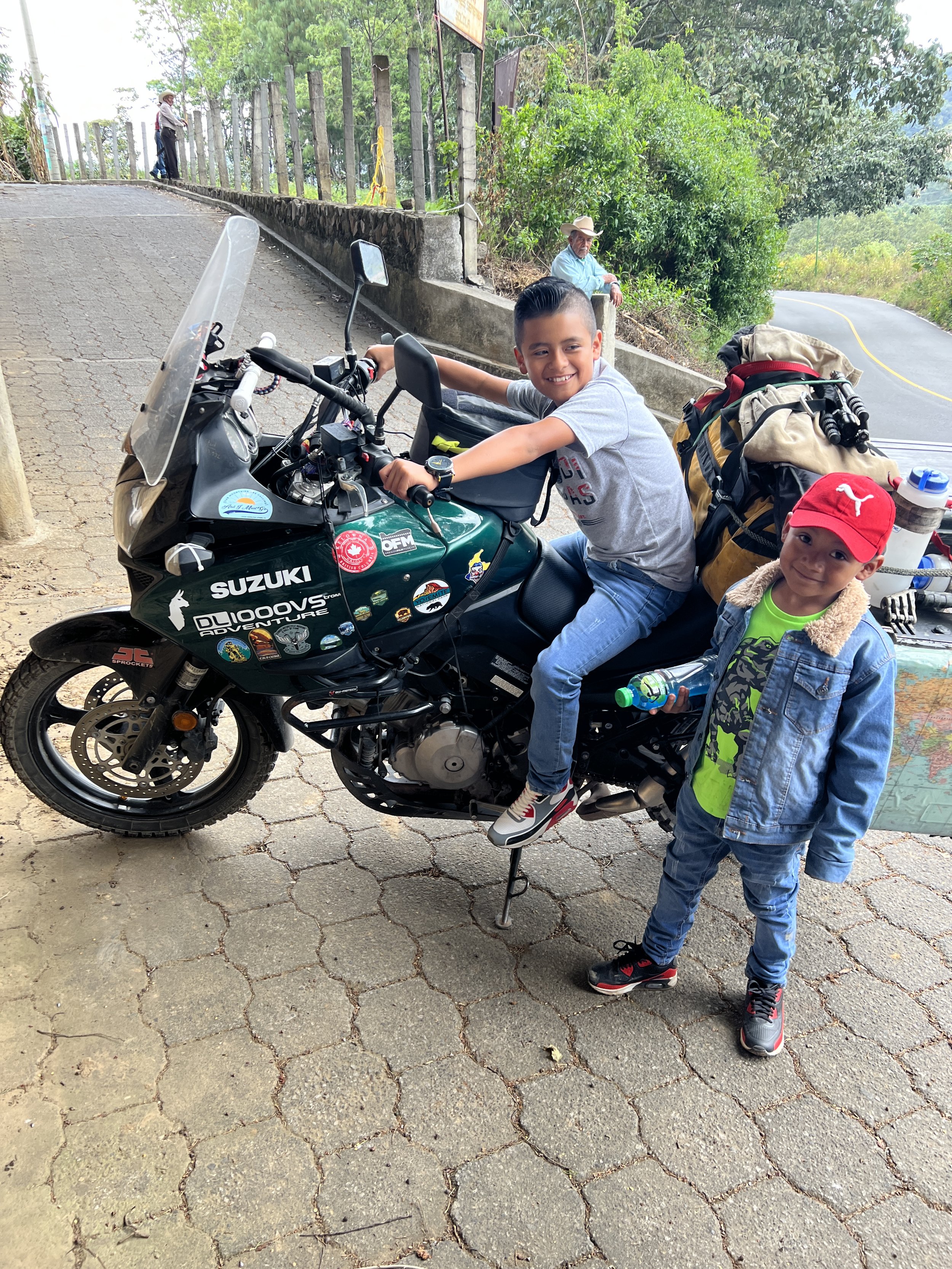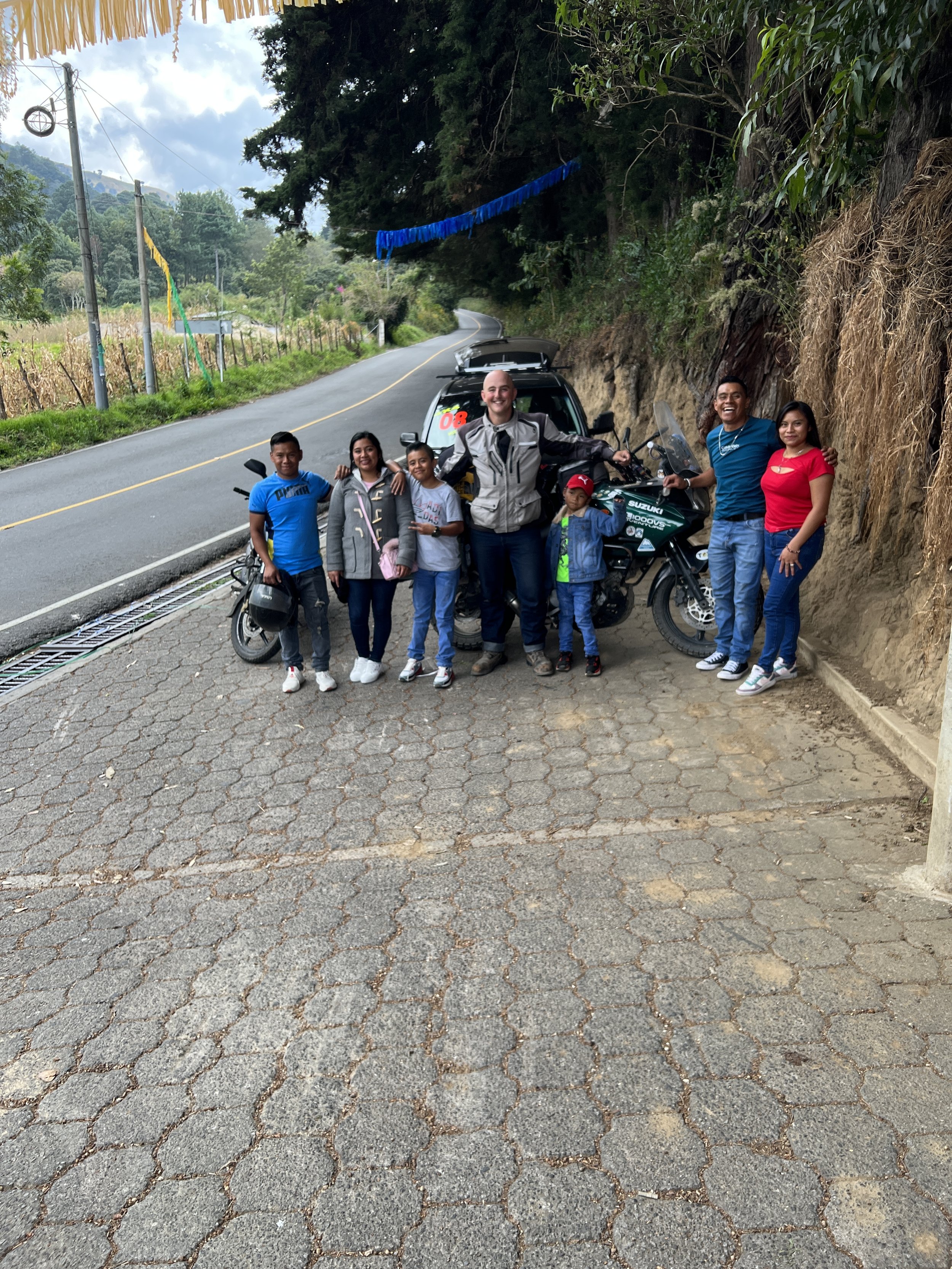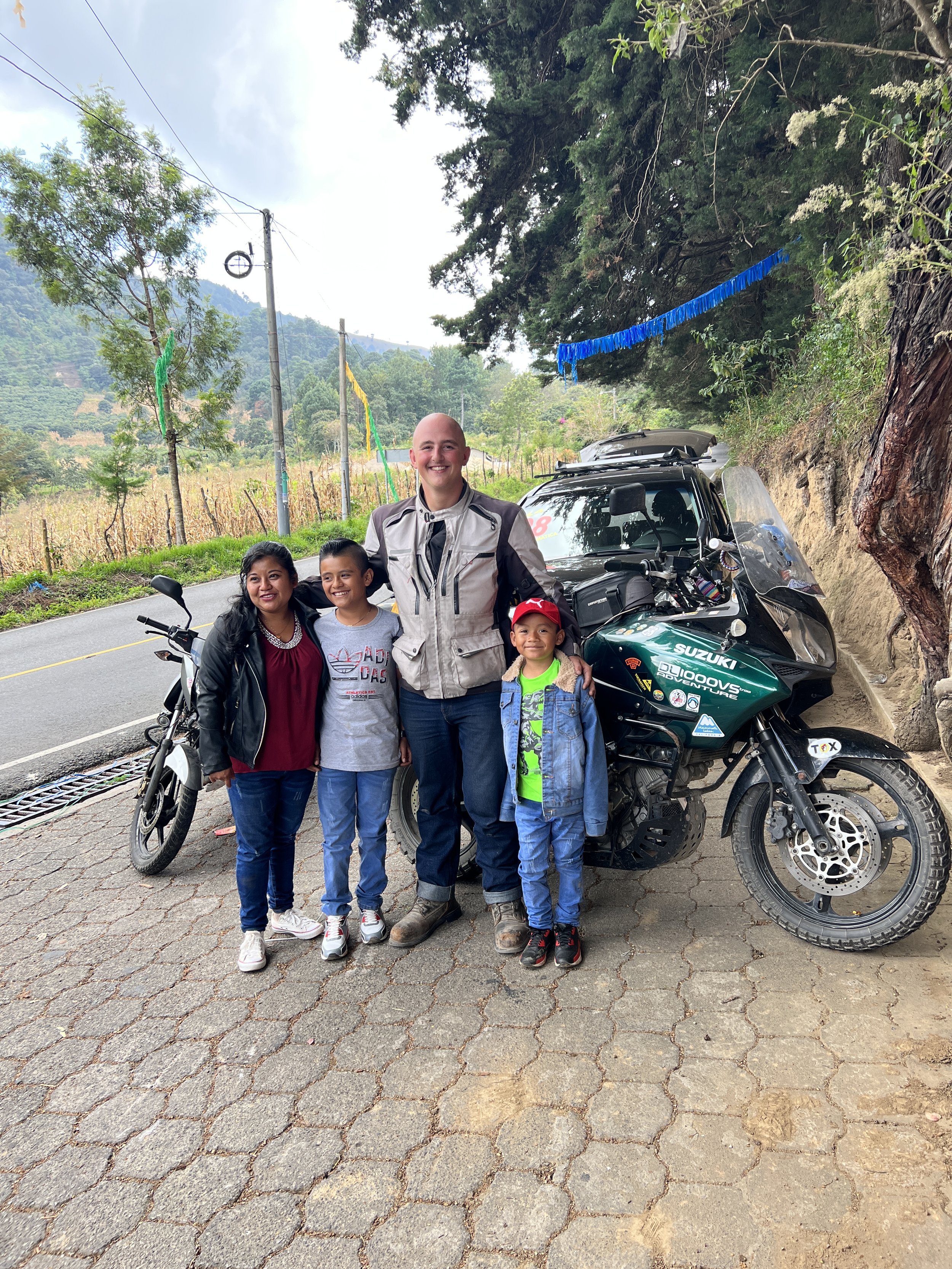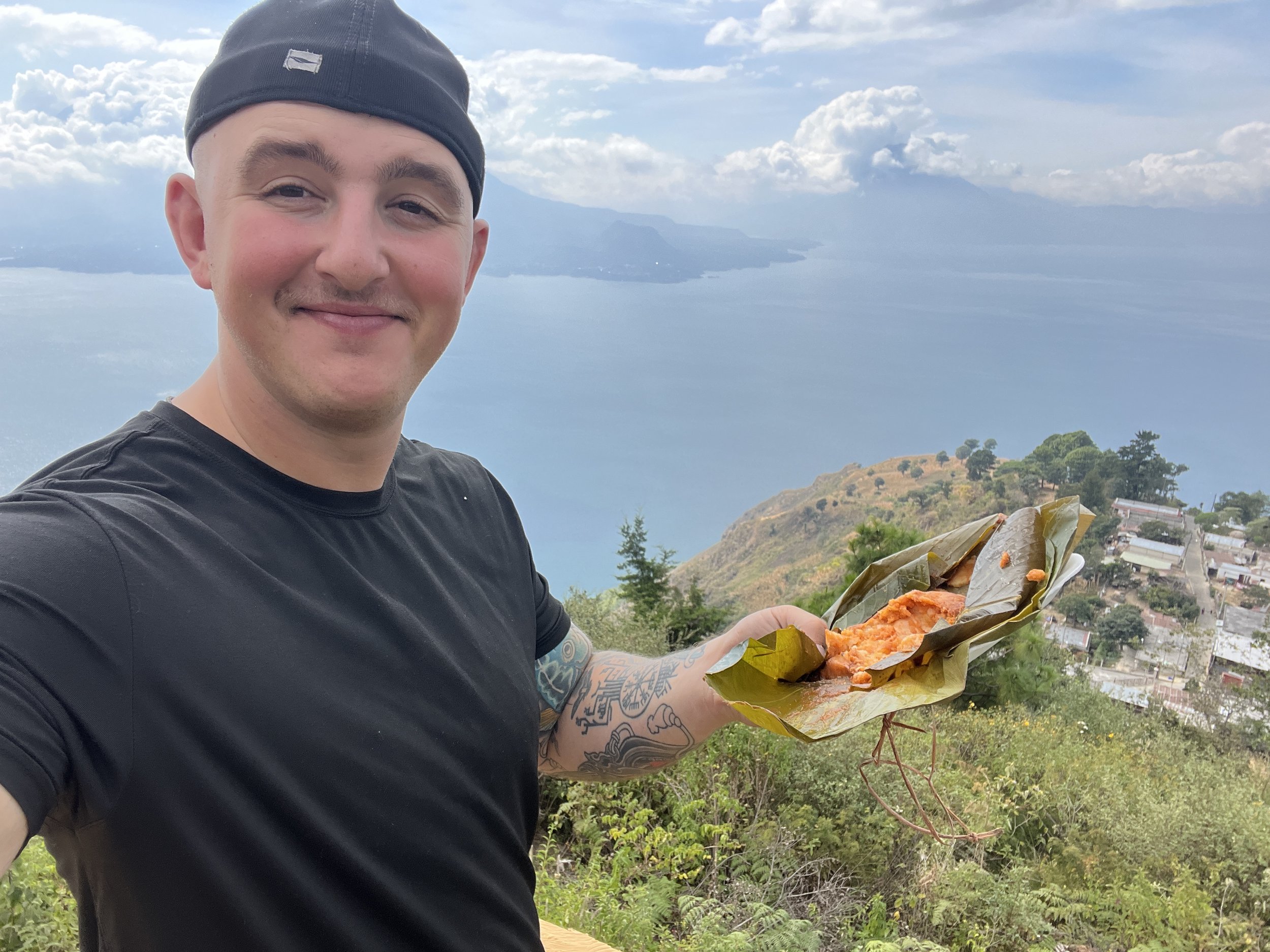Product Review: Lochby Pocket Journal
My detailed review as a scatterbrained writer of the Lochby Pocket Journal - the perfect intro to the Lochby system, and a must-have for travel writers everywhere!
I write a lot. I can be a little scatterbrained. I’m a little sentimental.
For years, I’ve been in search for a way to keep my thoughts - the little ping pong balls floating around my head like a bingo cage - in order. And for years, I used the Notes app on my phone.
While the notes app has always been convenient, I’ve never loved the idea of having to pull my phone out any time I had, say, an idea for a new motorcycle ride, or a blog post, or a bit of wisdom I pick up on my day to day. It always goes the same: I have an idea, I pull my phone out, write it down, and then get sucked into some level of doom-scrolling. All bits and pieces of my life existing in - gasp - “the CLOUD.”
About two years ago, I started carrying a dedicated pocket notebook, and that changed. The endless social media scrolling stopped. My general sense of mindfulness improved. I became less forgetful. And while I often carry a large notebook for more intense journalling, project planning, or class notes, I generally want something a little smaller for the spur-of-the-moment ideas, shopping lists, etc.
When I recently partnered with Lochby as part of their ambassador program, I was excited - I’ve passed by their products time and time again in a hundred stationery stores across the country. I’ve always found myself thinking, “One day…”
Well, that day was a few weeks ago, and I’ve got some things to say.
THE GOOD.
Like I said: Having a physical medium on which to jot my thoughts has such a deeper meaning than sending them off into a jumble of old notes on my cell phone. It turns all of the confusing bits and pieces into a physical thing; something I can take to a mentor and say, “Help me please.” I’m more inclined to write when I have pen and paper in my hands, especially when the notebook itself is comfortable to use. Lochby uses their own branded pocket journals, all made of the legendary Tomoe River Paper. It’s perfect for daily EDC use, especially when you’re like me and currently on a fountain pen kick. I’ve found these journals work great with my Kaweco Sport Brass! At a pricetage of $49.99, you’re getting a lot of utility for the value.
The journals themselves are on the pricey side; a four-pack will run you about $22.99, meaning about $5.75 a piece. For comparison, a 3-pack of Field Notes Brand notebooks generally run $14.95, or about $5 per book. Heck, you can get an 8-pack of generic pocket notebooks on Amazon for $7.99. That’s less than a dollar a book!
For general use - people perfectly fine with the typical office clicky pen or a carpenters pencil - you may want to go a more affordable refill. If you’re like me (read: a little picky on your choice of stationery), then the extra 75 cents is worth every penny.
WHY REFILLABLE?
My coworker said to me recently, “I don’t get the notebook fascination. It’s just paper. Why not use a regular notebook?”
“I don’t need that negativity in my life, thank you very much.” I said.
KIDDING.
But it’s a fair question - why spent a extra money on a refillable, durable, waxed-canvas notebook cover that you’re always going to have to pay to refill?
To me, it comes down to utility; the ability to use a single notebook cover for multiple topics. The Lochby Cover has two opposing pockets, both of which can fit at least one, if not two journals. Disclaimer: four journals is a bit snug, and not recommended. I’ve used a maximum of two.
I also find a full-sized notebook - 100 pages or more - a bit intimidating. I’ve got a stack of half-filled Moleskines sitting in my closet for a reason and the Lochby freed me. I can use small refills at my leisure, changing them on whenever a new project or group of ideas strikes!
VERSA-DURA-BILITY
When I’m traveling, I have two requirements for my gear: it has to last, and it has to serve multiple roles. I can’t worry about having to repair on the road, or finding last-minute replacements. I need gear that saves space. With this journal cover, I’ve solved a few inherent problems of travel EDC: I found a wallet, a place to jot my experiences, and, in the case of international travel, a passport holder. I can toss an emergency $20 in the pocket, or a random sticker from a restuarant I loved that I don’t want to lose - it’s a piece of my story on the road. The rugged waxed canvas is thick and durable; I don’t have to worry about spilling a cupof coffee on it, or throwing it in my motorcycle jacket packet on a rainy ride. I like knowing my ideas are protected!
THE BAD
Can’t have the good without the bad.
1.) The size.
As much as I like the journal cover itself, I can’t fall in love with the size. It’s just a hair too big to fit comfortably in my back pocket, and is best carried around like a clutch wallet or tossed in a bag or backpack.
2.) No dedicated pen slot.
While there’s technically a slot on the outside of the notebook (three, actually), they’re not great for any pens larger than a pencil, nor are they good for pens with a rubber grip as it leads to an obnoxious catching. Also worth mentioning is that a pen in the outside slot will result in some ugly markings on the front from the distressed wax on the canvas. On the inside, theres a small slot that will fit something like a Fisher Space Pen, but I find myself tucking my pens loose inside the zipped-up package.
3.) No vertical pockets.
Maybe this is personal preference, but I find that only having horizontal pockets can be slightly limiting for use as a wallet. By having the three horizontal pockets on the left side flap towards the back of the cover, anything protruding from the large horizontal pocket causes your cards to get lost, in a way. It makes me wonder if this journal is meant to be just that: a journal that CAN be used as a wallet, rather than a journal that SHOULD be used as a wallet.
OVERALL
This journal cover is the perfect choice for someone looking to get into the world of pocket journals. It’s easy to use, works really well as a wallet, and (my favorite) it’s a great talking piece. I’d recommend this to anyone wanting for a rugged, multipurpose piece to their EDC that doesn’t kill the bank. It’s a great entry to the Lochby system, and worth every penny!
Want to pick one up for yourself? Go snag one today!
Here’s What You Need to Know about the Police in Mexico…
Tips on how to avoid having to bribe a cop in Mexico, from someone who has had to bribe a cop in Mexico.
Mexico's "El Portrero Chico", as seen through the lens of my drone. I paid a bribe to a cop just twenty minutes earlier.
vfk I had to pay a bribe on my third day in Mexico. Here’s how it happened, and here’s how to avoid it:
For those of you new here, a bit of backstory: I was on the road from September 2021 to December of 2023, riding an aging motorbike all the way from New York to the bottom of South America, all before selling the bike and flying home.
I crossed into Mexico in October 2022 after a little over a year, and it took less than 72 hours before I had to pay "una mordita" - a "little bite" - to a cop.
I’d been staying in the spare bedroom of the mother of a friend of a friend of a friend in Monterrey, a sleepless city some two hours south of Laredo, Texas. After two days of eating street tacos and training jiu jitsu, I rode north of the city to Hidalgo on my fully-loaded, foreign motorcycle. The suspension, recently rebuilt, floated and then clunked as I passed over a set of train tracks. Off to the roadside, I saw a cop car. Less than 30 seconds later, I'm getting pulled over by said cop. I pulled my helmet off.
"You hit that car you passed over there.” He says in Spanish.
It behooves me to reiterate that, in that moment, it’s my third day in Mexico - my third day in Latin America. And in spite of 3+ years of classes in high school, and a few jobs working in restaurants and on landscaping crews, I speak roughly ZERO Spanish. But I’m confident, and decide, "Hey, let's try this out."
So I say, in very broken Spanish, "I'm sorry, I don't understand. I didn't hit anyone.” Then he starts saying the magic words.
Papeles.”Papers."
Pasaporte. ”Passport."
He was a short man with a paunchy gut. His uniform was pressed neatly, thought the heels of his khaki pants frayed - a sign of his constant efforts to fight his stature. His hands hung in front of his gut, fingertips tented together as he spoke.
I opened my top case to hand over the registration, my passport, even the orginial title for the motorcycle. He glances over the papers with indifference, like a hunter tracking a buck and only finding does.
He then asks, "Seguro?" And I got confused. Why would I buy security?
He pulls his phone out and translates it.
Seguro = Insurance.
That's when I realize, "Fuck me sideways. I forgot to buy that at the border." I’d bought the TIP, the $40 temporary import permit that allowed me a potential six months in the country. The only other document I needed, was basic liability insurance. Coming from the US, I knew you could at least get your a car towed by driving without insurance.
I knew I was caught, so I pull my phone out and type into Google Translate, "I'm sorry. It's my third day here, and I forgot to buy insurance at the border. I can buy it right now on my phone.”
He reads it, looks at me through slanted sunglasses.
"Ok, VAMANOS.” He says. He turns on his boot heels, taking a step towards the car... And then opens the back door to the police cruiser. At the same time, another police car pulls over. The man exiting the car is taller, his navy blue button down tucked neatly into pressed, black pants. The only thing making it clear he’s a member of “La Guardia Nacional” is the patch on his chest and two silver pins pressed into his shirt collars. The two men embrace with a handskae and a smile. Words pass between them, but I don’t hear.
Scenes flash in my head in a fraction of a moment; I’m suddenly shirtless on the yard in a Mexican prison, desperately awaiting calls from home while trying to survive as el gringo; my older brother hugging me in Dallas before I left, saying, “If you get kidnapped, I’m not paying a ransom.”; the thick, smoky air of the booking room down at a mysterious, sinister, concrete-walled police station. I knew, surely as I knew how to ride the fucking motorcycle, that I was about to go to jail in Mexico.
He reaches into the back of the car and pulls out his leather satchel from the back seat. From that, he produced a notebook.
"Es un infraccion." An infraction.
Okay, I think. I can do a ticket.
Nerves and anxiety do funny things.
"It's 100 US DOLLARS.” He continues.
And in a moment of clarity, like the lights turning on in a dark hallway, I realize I'm being gotten good. Conned. Bamboozled and taken as the gringo who doesn’t understand how things work. I think to fight it, but it's a fair infraction - I did forget to buy insurance, and admitted to it. I considered the fact that prolonging the interaction means a potential confiscation of the bike, my documents - hell, whatever this guy and his partner want.
So I say, "Okay - let's go to the station. I'll pay it there." He says something I couldn't understand, but judging by the attitude in his voice it was something like, “It'll cost more at the station.”
I start to think of all the times people have told me about bribes in Mexico; the stories of adventureres past who I’ve followed throughout my years of planning this adventure. Ted Simon. Ewan McGreggor and Charley Boorman. Dave Barr (no relation.) I decide to try my hand at it all.
I say, "Can we just take care of it here?"
He looks left. Looks Right. Then says, "It's my lucky day." He beckons me to the other side of the police cruiser.
I pull a USD $20 out of my jacket pocket.
"$75." He says.
I say no way, and pull another 20 our of my pocket. He still has my documents. And again he refuses.
“$70.”
Finally, I pull the last bit of pesos I have in my pocket out - 60 or so. He plucks it from my hand, stacking 60 pesos onto $40USD for a total of roughly $43. I felt the tension ease. He was satisfied.
And then, in perfect English, he says, "Thank you very much. Now you go."
The whole bit of Kabbalah cost me USD $43, and it's that I will share with you now:
In most countries in Central America, you're required to have, at minimum, liability insurance, much like the USA. The only country I can recall not needing ANY insurance on the way to Ushuaia was Ecuador.
In situations like this - manufactured traffic stops sourced in the fact that you, future traveler, will simply look foreign - Cops will call in officers as “backup” as a form of intimidation. They will confiscate your documents, your passport, even your motorcycle if you give them a reason to do so.
It’s going to be scary. After all, you’re no longer in your home country - the place where people are “innocent until proven guilty.” In most Central and South American countries, it’s the opposite.
All that said: here’s the advice - the “tried and true” method of evading the oft-mentioned Mordita.
1.) Know your rights: In Mexico, it is expressly illegal for cops to ask for bribes. Any cop being caught soliciting during a traffic stop will get fired, and potentially arrested for doing so. For many members of la policía, that job is not worth losing over a few pesos.
2.) Get a GoPro: To piggyback off of number one, a GoPro can be your best friend during a traffic stop. I’ve had more than one cop abandon an obvious bribe attempt once I pointed out the recording camera. Video evidence isn’t something they want kicking around.
3.) Never speak Spanish: My advice? Even if you speak Spanish, no you don't. The goal with any police officer is to try waste as much time as physically possible. DISCLAIMER: Obviously, this is assuming you know they're going to try and get a bribe. If you’re at a military checkpoint - one that you know is a checkpoint - feel free to exchange pleasantries in your tongue of choice.
4.) Have Copies. Multiple Copies: I never offer my orginal documents. I hand over copies, and if they request the originals, simply say (in English), that they’re burried deeply in your luggage, and then take your sweet time in finding them.
5.) Never Keep Cash in a Single Pocket: A one-way trip to having all your money taken is pulling out a stack of cash. You should be hiding your cash all over the place; some in each pocket of your jacket, some in your luggage, some in a money belt UNDER your T-Shirt (ideally, this is where you’ll also keep your original vehicle documents), etc. This gives your the opportunity, like I did, to pull out a $20 from one pocket, another, and another.
6.) “Vamos a la estacion.”: Any “fine” an officer quotes you can be paid at the police station, and you should insist on doing so. They’re required to give you a “boleta”, or a reciept for your payment. If an officer can’t provide a reciept, you can assume it’s an “unofficial payment.”
Riding my motorcycle through Mexico involved two of the most culturally enriching, scenically beautiful, and symbolic significance of my entire journey. It’s a wonderful country that, especially in the US, is a victim of reputation. I’ve camped outside in parts of the country on the “Do Not Travel” list from the US State Department; floated a river below 200ft. waterfalls; had one of my teeth cemented back together in a dingy dentist office in Mexico City. Hell - even had a gun pulled on me while riding over a volcano.
The reputation can be scary, especially that around the Federales (the infamous Federal Police only existed from 1999 to 2019, after which they were succeeded by the National Guard), but I encourage you all to look past it. Mexico has rules, just like everywhere else. Know the rules, know how to navigate them, and know what you’re capable of.
Get out, take some risks, and go explore!
Mike’s Poorly Developed Spanish for Motorcycling the Americas
Ten of the phrases I used every day during my 400-day ride through Central and South America.
Right after crossing the border into Mexico, and the last time touching American soil for nearly 400 days.
In October 2022, as I first rode south across the Columbia Bridge - a small border crossing 20 minutes outside of Laredo, Texas - my Spanish fluency amounted to 3 years of once-a-week classes in high school.
Beyond “Donde esta la biblioteca?” and “Puedo ir al baño?”, I was pretty useless.
And yet, less than a year later, I found myself in Río Grande, one of the last small towns north of Ushuaia, Argentina on November 21st, 2023 doing something I’d never imagined: I was training jiu jitsu at the bottom of the world, and not only was I training, I was teaching a class to people that didn’t speak a word of english. And they understood me.
In 2024, it’s possible to get by on pantomiming hand gestures and Google Translate. I know that because that’s how the first five weeks went in Mexico. I remember calling my dad, fluent in Spanish in his own rite from a decade as a general contractor, at the end of every day saying, “I’m so mentally fried from the language barrier. I can’t function. I don’t know if I can do this.”
But “getting by” isn’t why we travel. We travel, especially on motorcycles, with the goal of immersion; of wrapping ourselves in the intricacies and stories and cultural blankets of our given routes.
We want to chat with the hotel owner of a small inn below Mexican volcanoes, or the dock workers loading our bikes onto the ship about to take us up the Amazon River. We want to be able to ask for directions when our phone dies in a small town in Peru during a regional power outage.
We want to make people laugh.
We want to connect.
And in the spirit of that desire to connect, I’m going to give you a list of the phrases I used almost every day on my 400 day stretch to the bottom of the world:
1.) “Lo siento, pero necesito hablarme mas despacio; como yo tengo ocho años.”
Courtesy of my father, this lovely phrase translates to, “I’m sorry, but you need to speak to me slower, like I’m 8-years-old.” This always got a chuckle from the locals, and would often result in them complimenting my remedial grasp of the language.
2.) “Hola! Estoy buscando por _______________.”
Translates to, “Hi! I’m looking for _________________.” Could be food (comida) , a place to buy snacks (bocadillos), a hotel for the night (un hotel para la noche), etc.
3.) “Hay una problema con mi moto. Hay un taller muy cerca?”
Translates to, “There is a problem with my motorcycle. Is there a workshop nearby?”
NOTE: Google Translate will translate “Mechanic” as “Mechanicó.” In Central and South America, 99% of the time people are going to use the word “Taller”, pronounced Tie-yare, when referring to a place that fixes motorcycles.
4.) “Hola, tengo un reservacion esta noche. Hay estacionamiento en el hotel?”
While technically correct, I feel like this one is wordier than it needs to be. That said, this once is best used when making a reservation via WhatsApp - something I would do often. This one means, “Hi, I have a reservation tonight. Is there parking at the hotel?” Nothing worse than making a reservation online, arriving at the hotel, and then realizing you need to parkt he bike outside overnight.
5.) “Es seguro aqui?”
“Is it safe here?” Always a weird one to ask, but I’ve never gotten any side eye, especially in places that historically have bad reputations for safety.
6.) “Que puedo hacer por aqui? Que me puedes recomendar?”
Translates to, “What can I do around here? What can you recommend to me?”
7.) IN BOLIVA: “Sin factura es posible?”
Translates to, “Is it possible without a receipt?” This one will procure reactions ranging from a simple, “No”, to quickly thrown profanities and being told to leave the gas station. Allow me to explain: In Bolivia, gasoline is subsidized by the Bolivian Government, meaning that locals pay one price while foreigners, extranjeros, pay a precio internacional that is roughly 3-4 times the local prices. One of the workarounds, of which there are many, is simply ask the gas station attended for gas without a receipt. Oftentimes, they’ll concede to a price somewhere between the local price and the “gringo price”, and pocket the difference.
Note: Generally not needed when buying gasoline from coca cola bottles near Salar de Uyuni. They do cash prices!
8.) IN COLOMBIA: “Que Chimba!”
Colombian Spanish was a little tricky to learn, mainly due to the speed and the slang. “Chimba” is one of those words you’ll hear tossed around all the time. Best translation for this one is, “How awesome!”
9.) IN MEXICO: “No Mames, Guey!”
A classic. Bonus points for extending “mames” to “maaaaaaaaaaames.” Esentially means, “No way, man!”
10.) “BUJIAS” not “BRUJAS”
The word for spark plugs is BUJIAS, not BRUJAS. How do I know this? Well, let’s flash back to San Gil, Colombia. It’s March 2023, and my VStrom is due for a tune-up at 65,000 miles. New timing chains, nem motor mount bolts, oil change, valve adjustment, and, lastly, spark plugs. I confirm the work with the taller, walk downstairs to the parts counter to confirm everything, and see that they missed the spark plugs.
So I say, with full confidence, “Necesito dos BRUJAS, por la moto.”
They two women behind the counter look at me, heads cocked left and right. “Que????” They ask.
I’m confused - I’m asking for a really common motorcycle part. Spark plugs. Electrical life of the engine. So I say again, “Dos BRUJAS!” Two spark plugs!
Again. Side eye. So, I give up and pull out my phone and Google Translate. Maybe there’s a bit of Colombian slang I’m missing for this particular part.
Which is how I found myself, face as red as the stripe on the Colombian flag above the counter, realizing that I’d just told two Colombian women, “Hi, I also need two WITCHES for the motorcycle.” Not my finest moment, but I’ll never forget the word for spark plugs (or witches, apparently.")
Advice
Spanish is hard. You’ll have to deal with local dialects, slang, accents, and rapidly evolving vocab. You’ll encounter regions, like those Guatemala and Bolivia, where Spanish is a second language for entire provinces. In a way, it’ll make your Spanish feel amazing.
But do yourself a favor: embrace the difficulty. Embrace the adjustment period where you’re saying, “Lo siento, no entiendo” all the time. (“I’m sorry, I don’t understand.") Embrace the mistakes, as you’ll never forget the awkward moments.
Learning a new language was one of the most fulfilling pieces of that entire journey; it’s a skill that I value every day, and use often.
Ask for help, keep a journal, and learn AS MUCH VOCABULARY AS YOU CAN. Aim for 10-15 new words a day. From there, find your key verbs and phrases, then use your vocab to MadLib those phrases.
But above all: keep trying. You’ll get it!
Notebook and a book of Spanish phrases - my DAILY edc for the first few months.
My recommendation for "easiest Spanish learning booklet": See it, Say it Spanish by Margarita Madrigal. You can go pick it up HERE! (Not a sponsored link)
Did I “Find God” On the Road?
"And yet, when I experience things like I did yesterday: watching the sun rest in Denver behind the Rocky Mountains, with golden rays of light climbing skywards and the tell-tale “purple mountains majesty” painted against the city backdrop, only to feel what I can only describe as grace - the “finger of God” reaching out and touching my heart, I’m more and more convinced."
Riding below the pillars in Valley of the Gods State Park, March 2022.
My dad likes to say, “I raised you guys ‘religion neutral’ so you could choose for yourself.”
I didn’t grow up in church on Sundays or going to temple weekly, much to the chagrin and disapproval of my grandmas and grandpas. My heritage begged for one or the other, but outside the bar mitzvah’s growing up and the occasional christening, I’ve never considered myself connected to a higher power.
Instead, I grew up in 12 Step rooms, watching moms and dads (my own Dad included) mending the trauma they’d all inherited from their moms and dads. I saw humanity. I saw pain. I saw people begging to God for help and forgiveness.
I grew up loosely believing in the universal spirit - the one who could grant serenity and acceptance in the things I couldn’t change, the courage to change what I could, and the wisdom to know the difference.
While spending years on the road, whether riding across the western American plains, or through the biting cold winds of southern Patagonia, or throwing water skywards in the frigid water of a Colombian waterfall, I felt closer to God than I ever had.
When my dad nearly died in a motorcycle crash just hours into my own moto journey, it was hard not to feel the presence of something greater.
When I went through loss - one of the greatest of my life - while surviving the blistering heat of the Northen Amazon, I had to rely on not my OWN strength to get through it all, but the strength granted to me to accept what I couldn’t change.
The courage and the wisdom I relied on to take me through my time traveling was hard-earned: I fought, cried, bled, and broke bones in the persuit of a life I’m proud of. I’m still not sure I want to grant that strength to a divine, “Holy God.”
I don’t believe I was created in God’s image. Can’t buy into the idea of “Christ as my lord and savior.” I’m not always strong in my belief in an eternal, paradisical afterlife.
Father and Holy Ghost? Sure. The Son? That’s a little harder to accept.
And yet, when I experience things like I did last week: watching the sun rest behind the Rocky Mountains, with golden rays of light climbing skywards and the tell-tale “purple mountains majesty” painted against the city backdrop, only to feel what I can only describe as grace - the finger of God reaching out and touching my heart, I’m more and more convinced.
So when people ask me, and there have been a bunch: “Mike, did you find God out there on the road?”
I would say that I think I’ve always had an idea about God, but wasn’t able to feel a connection close enough to that omnipitent energy. It wasn’t until I was able to get out and see what that spirit - the “God of my Understanding” as some of the clients I’ve been working with recently would say - had in store for me in a world beyond my comfort zone. I feel it more now; in the faces of the people who light up when they see me, or in those moments where I feel like I’m exactly where I’m meant to be at that exact moment in time.
The last two years have brought me closer to a higher power than I’ve been able to feel before; it feels less lonely, and feels like it came at the perfect time.
How’s that for a “quarter life crisis?”
My Top 5 Favorite Roads and Rides
My top five favorite rides as a motorcycle travel photographer and writer.
I’ve spent a LOT of time on motorcycles. Thinking back on the last eight years, the number of miles is close to 90,000, and I inch closer to that 100k mark every day I ride into work (40 miles round trip; almost there!)
You spend enough time in this community and you hear of the iconic rides: the snaking, meandering miles on the Blue Ridge Parkway, the Ring Road in Iceland, the mysterious Road of Bones in far eastern Russia, etc. And so it seems, whether at a random coffee shop in Smalltown, USA or in the waiting room of a Suzuki dealership in Guatemala City, you’re only one or two degrees separated from someone who has “the favorite ride they’ve ever taken.”
In Argentina, I met a Swiss guy - Lukas - who was going on his seventh year of round-the-world riding. He cited his months in Africa as the best miles he’d done.
In Guatemala, I met a young rider named Stefan atop Temple IV in Tikal National Park, who cited the ride from his small town on the east coast of Guatemala to Lake Atitlan as his favorite.
For Celine and Stefaan, the Dutch/Belgian couple I met in San Martín de Los Andes, their favorite stretch of motorcycle road wasn’t a road at all, but the 500-mile stretch of Amazon River they’d traversed from Yurimaguas to Leticia. They said, “It was our favorite part of the journey. It was just so wild!”
And while I’ll always advocate for the “No plan, just ride” approach for any good motorcycle trip - the one where you shut off the GPS, start riding, and ask the gas station attendant, “Hey, what’s cool around here?” - I wanted to highlight some of my favorite stretches of my 90,000+. In no particular order…
US Highway 191: Southwest USA
Starting the list with a bit of Americana, US-191 is a two-lane highway spiking right through the heart of the American Southwest. The entire route runs North-South, starting at the Mexican border in Douglas, AZ and running all the way to Canada near Loring, MT. While I haven’t ridden the entire stretch, I can confidently say that this is a contender for the most scenic single road in the USA. To be able to start at Mexico and end in Canada, and with just a few turns be able to experience the natural, near-spiritual beauty of places like Arches, Canyonlands, and Yellowstone National Parks is something that riders like me yearn for. Some of my finest memories from my two year sabbatical come from this stretch of highway: fording a midnight thunderstorm near the Tetons of western Wyoming, riding the canyons and amongst the towering Douglas Firs of Yellowstone, even picking up the concurrent section of I-90 outside of Bozeman on a 24-hour, 1,000-mile marathon from Calgary to Sturgis. My personal favorite stretch, however, sits just off 191; a small collection of desert towers south of Mexican Hat, AZ. If you’ve seen Forrest Gump, you’ll know what I’m talking about. Monument Valley is one of those views that make you believe in the godliness of the Southwest; the notion that, in spite of your [read: MY] pseudo-agnostic predilictions of your early-mid 20’s, there may be something to this “creator” thing. Don’t believe me? Go. Watch as the sun picks up a paintbrush and flings it across the twilight sky like a heavenly Picasso. You’ll see.
Paso de Cortez: Puebla, Mexico
“You can’t miss it. Just look for the volcanoes.”
That’s what Gary told me. I met Gary, a British ex-pat, outside a Sam’s Club in the University City area of CDMX. Gary was one of more than a dozen hosts I’d met on Bunk-a-Biker: a couchsurfing-type website catering to motorcyclists. He hosted me for a week while I explored the city by day - now one of my favorite cities in the Americas - and entertained me in the evening with stories of moving to Mexico in the 90’s. Did you know that Mexico City has been ravaged by major earthquakes not once, not twice, but THREE times in the last 50 years, ALL of which happened on September 19th? Not me. Not until I met Gary. And it was Gary who pointed me in the direction of this entry. Paso de Cortes is a mountain pass southeast of Mexico City, cresting out more than 11,000ft. above sea level. Did I mention it runs between two active volcanoes? I spent Thanksgiving 2022 climbing up and between these quiet giants - Popocatépetl and Iztaccihuatl. Popo and Izta, for short - Izta is quieter than Popo. Starting from Amecameca on the western side, you climb perfect, loping curves on solid blacktop all the way to the summit, where you’re greeted with remarkable views of the volcanoes. Ash spews from the top of Popo, the same ash you’re about to get very acquainted with. The fun begins on the way down; you’re light-headed from altitude, sliping and sliding on a literal road of ash. At a certain point, you may think, “Sand sucks, but ash is way worse.”
The sun is setting, and your GPS has you some 25 miles from the nearest town. It’s a cold night in November, and you’re still at 8,000ft. You decide to camp for the night, not realizing you’ve ridden onto someone’s property. That man is named Jose, and Jose confronts you with a gun - a rifle that, while not pointed AT you, is certainly pointed TOWARDS you. Once you explain, in broken Spanish and with the help of Google Translate, that you’re traveling to South America and just wanted to camp for the night, he points you to a more private spot, further from the road and potential bandits. He scares the hell out of you 20 minutes later, emerging from the darkness with a bundle of firewood. The kindness of strangers blows you away once more. Your cold night in the Cerros is punctuated with a sunrise to remember, sipping tea in the shadow of an erupting volcano.
Salar de Uyuni, Bolivia
I can’t really call this one a road. There aren’t “roads” on the Salar. There are islands. There are lakes, depending on the time of year. Heck - there’s even a Starway to Heaven. But no real roads. The Salar de Uyuni is the world’s largest salt flat, located high on the Bolivian Altiplano some six hours south of La Paz. Open Google Earth and look at South America; the Salar is the little white spot right in the center of the continent. It’s a beautiful, hellish, frigid, sunburnt expanse covering more than 10,500 square miles. The entire playa sits more than 12,000ft. above sea level. Remember the Paso de Cortes? Where I had a gun pulled on me? This is 1,000-feet higher.
And yet, when I think of the most memorable nights on my entire journey, camping out with Dean, a moustachioed Californian headed south on a 1990 Honda Transalp, on that vast expanse of salt is near the top of the list. We met in Uyuni, the nearby namesake city, just hours earlier after chatting for weeks on Instagram. After some pleasantries over coffee and Milanesa de Llama, we hunted down some gas (a pain that immediately outshined the decadence of the llama steaks), and ventured out onto the playa. We stopped for sunset at the world-famous Dakar Monument; a reminder of the 2014 Dakar Rally that brought thousands of riders to the salt flats. From there, we tore across the white blankness. He broke out the tent, and I opted for a jerry-rigged tarp setup off the back of the bike. I typically cowboy camp - no tent, no setup. But with the winds charging across the high plains, I conceded. Waking up in the middle of the night, I exited my sleeping bag into the biting cold to heed nature’s call, I looked to the sky. I could almost shake hands with the Milky Way, mesmerized by the billions of stars looking down at me. I thought two things in that moment: we’re not alone here, and song lyrics.
But tell me, did you sail across the sun?
Did you make it to the Milky Way to see the lights all faded
And that Heaven is overrated?
Avenida 106/107: Parque Nacional Huascarán, Peru
When I was planning my trip, I had a recurring dream: I was standing atop a mountain pass a-la “Roll Me Away” by Bob Seger.
I could go east, I could go west; it was all up to me to decide.
The largest mountains I’d ever seen towered above me. I felt small. I felt beautiful. I felt, like I would come to feel many times on the road, like I was exactly where I was supposed to be at that exact moment in time. And since experiencing that while traveling, I thought more than once, “Maybe that’s where God exists? In these moments.”
And it was on a late afternoon ride in Peru that I found the mountains I’d been dreaming of for so long.
Lisa and I had been traveling together for months at that point; falling in love, saying goodbye, and reuniting again. We’d just gotten to Huaraz - the toursim center of the Ancash Region, and for many, the gateway to the Cordillera Blanca, some of the most iconic peaks of the Peruvian Andes. The city itself is one of history, pre-existing the Incan Empire. Lisa and I arrived in Huaraz late after a planned a five-day ride from Chachapoyas that took twelve days. And for the first time in almost two months, we were parting ways for a bit: she was going on a trek, and I was settling in for some R&R. The day she departed, I sat in the loft area atop my hostel, looking north to the ribbon of snow-capped mountains in the distance. The next day, I unracked the saddlebags and departed for the mountains. I could spend hours trying to paint a picture of that day, and I suppose I will at some point, but for now I’ll say this: I felt close to God on that ride. I moved east on Av. 107: a perfect, paved route climbing up and over the Cordillera where I stopped to take in the picturesque landscape. The road summits at Punta Olimpica, a tunnel through the granite walls at more than 14,350 feet: the highest mountain pass of my riding career, and the highest transport tunnel in the world. The air was thin. The thinner the air, the crisper it smells. My chest was tight, and I struggled to breathe all while feeling alive and grateful.
107 descends into the small town of Chacas, where Peruvian abuelas sell cuy (guinea pig) out of burlap sacks and peddle handmade souvenirs to tourists while wearing traditional clothing. The town is cute, and had I not left my bags in Huaraz, I might have stayed a night there.
The ride back west over the mountains was the hard part. Had I researched, I might’ve known that Av. 106 was the rough road; loosely packed dirt and gravel running through rural grazing land. While I spent two hours riding east, I spent four riding west through alpine Forrests and past mountain lakes, all while the pebbles hitting my skid plate and my rattling bones melted together into a twisted song. Shortly after sunset, I emerged through a deep road cut to see the valley open up below. There they were: my mountains. Nevado Huascarán Sur, the tallest mountain in the Peruvian Andes, stood over the land like a king with a snowy crown. Cornices and glaciers draped themselves atop scarred, tattered granite walls. An omnicient god looking over innocent subjects. And across the way, the backside of the Cordillera Blanca - a skyline cutting east to west across the sky. I stood there, taking in the road bellow as a ribbon of hairpin turns before it shoots off like an arrow beyond the horizon. I was at peace.
Bear Mountain Bridge Road: Westchester, NY
Every rider has a place they cut their teeth; the go-to ride that filled numerous Sunday mornings in the Springs, Summers, and Falls of their early riding career. And for many, that holds a special place. Mine is a 7-mile stretch of of Rt. 202 in the Hudson Valley, near Peekskill, New York. Take a look at any online list of “Best Motorcycle Rides near New York City”, and Bear Mountain is there. Sitting some 400 feet above the Hudson, Rt. 202 hugs the contours of this stretch of the Hudson Highlands like a tutu on a ballerina. You start at “The Roundabout”, where on any given day in the summer you’re bound to see a dozen riders or more refreshing themselves with gas station pound cake and Dunkin’ coffee. After climbing up and over the summit, where a parking lot allows for a stop to view the valley, you descend down a beautiful stretch towards the Bear Mountain Bridge, once the longest suspension bridge in the world. You can continue north on 9D toward Beacon, or cross the bridge and explore Storm King and Bear Mountain State Parks. Either way, I spent hundreds of hours on these lengths of highway in the years between buying my first bike and leaving for the mysterious, enticing lands beyond my suburban upbringing, and rarely was there an hour wasted.
Conclusion
In Robert Moor’s book On Trails: An Exploration, Moor explores the what, why, and how of why humans are drawn to trails. He says, “We are born to wander through a chaos field. And yet we do not become hopelessly lost, because each walker who comes before us leaves behind a trace for us to follow.” And it’s this little piece that speaks to why I dove in on my favorite motorcycle trails: this is the trace I give you all to follow. There are some 40 million miles of roads in the world, with more being built by the day. I urge you all to get out there and fill your cups with favorites.
It opens at the close.
Reaching the end of the road at Ushuaia, Argentina: the southern end of the Pan American Highway.
802 Days of Adventure. 65,000 miles (and change). 16 Countries.
A cold breeze stirs me awake. My mind is torn from a dream - the same, recurring haze haunting my nightly dozes for weeks now.
I’m falling, or more accurately, we are falling. The bike slides out from under me, just like in Mexico and again in Peru. But instead of the kind locals coming to our aid, something dark lurks in the golden grasses that extend off for an eternity. I can’t clarify much beyond the lurking darkness in the wind-blown landscape. I’m in Argentina. The winds rush past me after tearing up and over the Andes before rocketing down, sometimes 20,000 feet, before draining and crawling across the narrowing end of the continent like floodwaters.
I’m awake. I reach for my phone - an automatic, unconscious act these days.
7:04am
November 21st, 2023
I glance out the window to my left and see a plain scene. Condensation drips down the glass like sliders on an audio mixer: one drop at level 3, another at level 9.
The grayness strikes me the most; gray rocks on the beach down below, a sky so gray it’s nearly white, grey brick on the baseboards of Motohostal Fin del Mundo in Río Grande, the motorcycle hostel at the “end of the world.” I arrived yesterday after a 240-mile ride from Rio Gallegos - one of a few industrial jungles sprouting from the barren Argentinian plains. I crossed two borders - one out of Argentina and one back in.
I’m moving fast - I have been since leaving Lima just a few weeks earlier. Why? Why all of a sudden, after two years and 65,000 miles? Before leaving Texas in October 2022, I lived one-year-a-nomad on a jaunt across the US - crossing my “homeland” on two wheels for the first time. Since crossing into Mexico, I’ve been moving southward for a year in a meandering, lazy push, sometimes only a hundred miles at a time. Yet, after Lima, the fumes in my soul, like the fumes in my gas tank, were running dry. In a word: exhaustion. I’m tired and ready to go home, wherever that may be. Maybe Texas to live with Larry, maybe California to bask in the good scenery and good riding weather alongside Dad.
I’m just done. I’m tired of feeling like my life on the road has become a chore. Tired of working on the bike. Tired of worrying that it’s going to give up on me at the final hour, something I imagine often - a piston heaving itself through the engine block. I’m approaching 100,000 miles on my iron chariot. I see and feel its age: subtle losses in acceleration, vibrations that are outside the norm, a cracked windshield held together with contact cement and fork tines, bumps, bruises, and scars.
I throw my legs off the bed and stretch, the hem of my thermal undershirt exposing a pale stomach. It’s cold, but the radiator to my left throws off a warm respite. Glancing around the dark dorm room, I can see signs of life - light breaking through the gaps between bed frame and privacy curtains, dusty and worn slippers, a foot dangling over the edge of the top bunk.
“Today’s the day.” I think to myself. It’s the day I reach the end of the road.
I get dressed in a flurry - three layers on bottom, four layers on top. It’s cold here at the end of the world. I slip on my boots; the Red Wings I purchased over a year ago off a clearance rack in Reno, Nevada. I think of how these boots touched down in 15 countries. The soles are worn down and no longer give traction. The toe box on the left foot is shredded from my crash in Mexico, not to mention thousands, perhaps millions of gears shifted.
Silvana is milling around the kitchen when I finally emerge for the day. I hear her unleash a rapid shower of Spanish to a man sitting at the table near the door. She’s a small woman with dark black hair and tell-tale valleys on her cheeks.
“Buenas Dias Mike! Como estas?” She greets me, smiling and energized. The clock on the wall reads 7:28am.
“Estoy bien, Silvana. Voy a Ushuaia ahorita, y voy a regresar en la noche!” I replied. My Spanish still sits around an 8-year-old level: good enough to communicate. Suddenly, I’m back in Texas at the Jewish diner with my dad. He’s saying:
Remember, this is your best friend: lo siento, necesito hablarme MUY despacio, y como yo tengo OCHO años.
Translation: I’m sorry, but I need you to speak to me VERY slowly, like I’m 8-years-old.
“How wonderful!” She says in Spanish, and continues, “Here, I forgot to give you this last night. It’s a gift we give to all riders who stay with us.”
She produces a certificate, and on it reads (in Spanish):
Certificate of Honor:
For having crossed the 54th parallel south, entrance to Antarctica and the South Pole, arriving at the city of Río Grande, door to the End of the World.
The end of the world.
Silvana follows me out to the bike after I wrestle it from the garage. I have to pay mind to the other bikes - ten in total, all plated from Brazil, Colombia, or Uruguay. I’m the lone North American.
The bike is light - most of my clothes and miscellaneous things sit on my dorm bed. The only thing I think to bring with me that morning is my closet: a bright yellow duffel bag from The North Face. Next to the jacket on my back, that bag is the only other item to have been with me every day on my journey south. I couldn’t leave it behind at the final stretch. I throw a leg over the saddle and kick the engine over. A smile draws across my face - a moment of gratitude for yet another ignition without struggle.
“I’ll see you later!” I say to Silvana as she circles the bike, phone in hand while she takes a video.
She waves me off, and it’s the beginning of the end.
I ride south along Ruta 3 as a light rain rolls in. The road hugs the east coast of South America - the transition from land to sea. Grey, flopping waves lap against the rocky beach on my left while golden grasses fight a losing battle against the wind on my right. If not for the milestone at the end of this ride, I might be bored of the scenery. I’m anxious - constantly worried that the engine is going to give out on me at the 11th hour.
The air is bitterly cold - a knife carving up my hands. The $2.00 fabric gloves do little to stem the pain. I think, for the millionth time, “I need to start wearing real gloves.” Eventually, I pull over on the side of the road, and dismount with the engine still running. I use what I’ve come to call the warmers - the exhaust feeding out of my tailpipes - to warm my fingers. It’s a delicate dance; one second my fingers burn from the cold, and the next they’re burning from the fumes. The velcro straps on my jacket sleeves, weak and useless, hang open, allowing fumes to run up my arms and down my chest. I’m warm. Off in the distance, a bicyclist works hard at breaking camp near the treeline, and I realize he’s at a campground. Argentina is kind to campers; every puebla from Salta to Ushuaia has a small, family-run campground. The outdoor spirit knows no limits here.
I stop for coffee and gas at a YPF, Argentina’s brand of state-owned petrol station, in the small town of Tolhuin - the only bit of civilization between Río Grande and Ushuaia. A 15-minute stop becomes an hour. I can’t place why, but I’m finding it harder and harder to get back on the bike; it’s feeling like a chore.
Eventually, I start moving again. The rain is coming down harder, and the wind stings my cheeks through my helmet. The face shield flew off somewhere in Bolivia after dozens of drops, bumps, and bruises since buying it in Medellin. I usually hide behind my windshield as to not lose an eye from road debris.
Rising from the flatlands near Lago Fagnano, the air thins, causing me and the bike to run rich. The engine roars at a lower octave when I downshift into fifth. My sixth gear is nearly useless on the uphill stretches. Snow engulfs the surrounding peaks that have forced themselves skyward forming the Regíon Cordillerana.
I pass a sign marking Paso Garibaldi -1500ft. Coming around a corner, from behind the building atop the mountain pass, the valley below opens up into a spectacular vista and is gone again as the road begins to fall. My speedometer climbs slowly.
45mph. 55mph. 65…
For 45 minutes, nature and civilization begin a slow-dance, one where the trees and rocky slopes begin to give way to resorts and vacation homes. I’m close - nearly there. The clean air gains the faintest harshness; nearly imperceptible changes in the particulate matter. It’s the first sign of the end. My heart races faster. Semi-trucks and passenger cars begin passing the other way, only noticeable based on how solitary the previous three hours were.
I round a corner, and that’s it. I’m there.
Two pillars rise from the roadside to create a portal: two massive stone monoliths topped with a Gothic crown. Wood paneling frames simple, white typeface. The Argentinian flag lays still, spare the gentlest of flaps during a passing breeze. The white letters read the word I’ve been chasing for two years:
USHUAIA
And like a dam breaking, I feel joy for the first time in weeks; the first time since leaving Bolivia. The depression of knowing my time on the road was ending, the anxiety of waiting for my bike to die, the sadness of being away from Lisa - the beautiful Dutch woman I fell in love with in Colombia, the numbness of watching my credit card bills climb higher and higher in the pursuit of this dream: it all went away. Instead, the joy of my accomplishments shines through, and I’m feeling alive again. I scream to myself in my helmet and then break into brilliant laughter. The sun peaks through the clouds above in spite of the snow falling around me, and light breaks through the mending scars in my soul.
I did it. I fucking did it. Two years, two months, and 11 days to the end of the world.
Author’s Note:
For the longest time, I’ve wondered about how I would be able to tell the story of my two years on the road. Frankly, I still do. After all, it’s been nearly ten months since reaching Ushuaia in November 2023. I’m working full-time again. I’m writing a book about my journey. I’m planning the next steps. I’m STILL digesting the magnitude of what I accomplished (with and without help from a new therapist.) When I sat down to write this blog post, an image flashed in my mind of Harry Potter, standing in the forest, looking down at the Golden Snitch.
It opens at the close.
I constantly tried to discern what my trip meant; what I was supposed to learn and what I was supposed to take away from it all. It wasn’t until being off the road long enough to realize that it needed to END before I could really begin the learning. I’m happy to say I know more now than I knew then. I know more every day.
New Year on the Road
“Well, if I make it, this will be a great story.”
I turned over in the dark, crowded dorm room and blindly felt for my phone. Squinting at the screen, it read “January 1st, 2023”. Noise filtered in from the busy streets of Panajachel, Guatemala - the familiar noises of street vendors and tourists venturing out for their morning coffee. I’d spent the last week and a half enjoying the scenery, the culture, and the people. “Pana” is one of those rare places where everyone shares the same story:
“Yeah, I showed up five years ago and basically never left.”
My first morning on the lake - talk about a great view to wake up to!
My first night was spent on the shore of Lake Atitlan, sleeping peacefully in my tent while Volcanos San Pedro and Atitlan lay watch over the landscape. While leaving a grocery store the next morning, I met Jaime - a local hotel owner and English tutor.
“I love helping travelers and people who are chasing their dreams.” He told me. “If you would like, you can be my guest at the hotel for free.”
I spent four calm, beautiful days at Rancho Fortaleza. In the mornings, I’d drink coffee harvested ten feet from the kitchen in which it was brewed and eat guacamole made from avocados felled from a monstrous tree on the property. Jaime walked me around the estate tucked high in the hills above a land born in fire. Panajachel sat quietly in the distance, as did San Lucas and San Marcos.
I welcomed the new year with Greg, a friend I’d made in Chiapas who was also riding down to Ushuaia - we’d been bumping into each other since Mexico. His father had flown down to visit, and the three of us smoked cigars and sipped sweet, burning Buffalo Trace as fireworks lit the night sky.
I packed up the hostel in a hurry and walked back to the bike. It sparked to life, and I waved goodbye to Marvin, the parking lot owner who watched my bike the night before. The road out of Panajachel meandered up and over the mountain, carrying me back to the main road. Stray dogs darted out at me as we passed, something typical of Central America which I learned to tolerate the best I could. Rounding a curve, I saw a family of eight stopped on the side of the road; the trunk of the car was open, and a motorcycle lay in pieces behind them. I decided to turn back - language barrier or not - and help them.
Heads turned to me as I dismounted and approached. Three of the men were huddled around an inner tube as one of them, a skinny man with trimmed black hair and a gold chain around his neck, fiddled with the valve stem; I assumed he was the older brother of the three.
“Estan bien?” I asked.
Always fun popping a tire. TWO tires, on the other hand…
He looked up and laughed, “No, no estamos bien!” We shook hands.
“Como te llamas?” What’s your name?
“Samuel, y tu?” Samuel, and you?
“Mike. Que tal? Que es la problema?”
From what I could gather, they’d been riding two-up on the 150cc motorbike when not one, but both inner tubes blew after hitting a pothole. Short on tools, they’d been stopped on the side of the road for over an hour trying to fix both tubes. The rear was an easy patch, but the front had a bent valve stem - Samuel had been trying for 45 minutes to bend the stem straight so the tube would keep air.
It seemed so simple in my head - just patch it and get moving - but then I remembered that I had to carry all the tools I could. I wasn’t 30 minutes from home and a tool kit and a garage. I offered them the use of my tire repair kit; his eyes lit up as I produced the shiny, new valve stem along with a removal tool. While Samuel and his brothers made quick work of the reinstallation, his mother reached into a cooler and produced two parcels wrapped in banana leaves.
“Quieres comida?” She asked. Would you like food?
She held the parcels in outstretched hands, and I tried to politely decline; two friends had just gotten food poisoning from the lake water, and I was weary of the local street food. And yet she was persistent enough to push past this, and on the side of the road in Guatemala I enjoyed some of the best chicken and potato tamales of my life. The children walked around the car and circled my bike from a distance. They were shy, sneaking glances at me, then at the motorcycle.
I looked to the mother:
“Quieren sentarse en la moto?” Do they want to sit on the motorcycle?
“Si!” She replied, and looked to the older of the two boys. “Adelante, mijo!”
He climbed onto the bike while I stood to the side, making sure he didn’t fall off or knock the bike over. A massive grin drew across his face as he leaned into the handlebars. I stepped in to turn the engine over, and he rolled on the throttle. Samuel came from around the car and laughed. He extended his hand,
“Muchas gracias amigo.”
“Por nada.” I said.
I repacked the tire kit and my tool roll as the family collected their things. Before leaving, the mother came over and asked to take a photo with me. She stood next to me and looked up:
“El es mas alto!” He’s much taller!
We all shared a laugh, and they thanked me again as I kicked a leg over the bike. Watching in the side view mirror as they disappeared from view, I laughed as I imagined those photos ending up in a family photo album. “Este es el gringo que paró y nos ayudó!” They’d say.
For the next hour, I rode on through the mountains. The roads were rough - riddled with potholes that locals spent time filling day by day. In Cocales, the GPS wanted me to go left on the main road to Siquinalá, then down to El Paredon, the small surf town on the beach where I’d planned to meet my friends Nicole, Savannah, and Dylan. But looking at the map, I saw a smaller road along the coast that looked like it would take me to Sipicate. I knew I could catch a ferry to El Pardon in Sipicate, so I asked a local sitting at the intersection,
“Amigo: estoy pasando a Sipicate. Hay un camino de Tecomate a Sipicate?”
The local, a shoeless, rugged-looking homeless man glanced at me. He sipped his beer, swallowed, and wiped his chin.
“Si, hay un camino en Tacomate.”
A short answer, but all I needed. I thanked him and continued on straight. The road ahead was pin-straight, encapsulated above and on the sides by massive palm trees. In the tropical climate, I felt like I’d been there before; not in the deja-vu sense that had popped up again and again in Mexico and Belize, but like I’d been somewhere that had the same exact scenery. An image flashed in my mind of a spring-break road trip during my sophomore year in College, crammed in the back seat of Paul’s Toyota Camry as we approached Tybee Island, Georgia. I’d driven us from the eastern end of Long Island down to the South Carolina/Georgia border on a 17-hour stretch. That was one of my first big road trips, and in a way led me to exactly where I was at that moment in Guatemala.
I stopped for gas and struck up a conversation with the attendants. They circled the bike and asked the typical questions; in response, I gave them the typical answers. I told them I was headed to Tecojate and onto Sipicate. One of them looked at me with concern.
“Caballero, No hay un camino en Tecomate. Necesitas regresar a Cocales.” He told me I needed to return to the main road where I’d spoken with the homeless local. I showed him the map and asked if there was a way I could go locally. He thought for a moment and explained to me that I could go back a few hundred meters, turn right, and continue on the dirt local roads. I caught a brief mention of a “Puente”, a bridge I’d need to cross over the river. After the bridge, I’d drop into Cerro Colorado, then ride on to Sipacate. The entire explanation seemed clear enough, so I turned out of the lot, waved to the attendants, and rode on my way.
The dirt road meandered through the corn and sugarcane fields, and the local farmers stared as I passed. After 30 minutes, I crossed a small bridge and thought to myself,
“Awesome - that must be the bridge he was talking about.”
I continued straight, bouncing in my seat to the music coming through my intercom. Two cars passed me going back towards the main road, and concern filled the faces of both drivers. Before I had time to process it, I crested over a berm in the dirt road. I stopped in place, and out loud, to no one in particular, said the first thing that came to mind:
“Get the f**k out of here.”
The road ended at a massive river. Running across it was a small bridge that stretched nearly 600 feet across, sitting five feet above the Rio Coyolate. It looked impossibly small, just a few feet wide, and had no guard rails. From above, it looked impassable - I couldn’t imagine it was possible for vehicles to cross.
“That has to be a footbridge…” I thought.
Surveying the scene. The bridge was maybe a meter wide, complete with rickety boards.
I coasted down the berm and spoke with a man sitting in a hut near the bridge. Meanwhile, unbothered children and mothers splashed in the water close by. I asked him if vehicles could pass.
“Si - hay una propina de 10 pesos.” There was a toll to cross the bridge, but I could cross. “Can it hold my weight?” Tengo mucho peso aqui. Puedo pasar en el puente?
He shrugged. “Si. No habrá una problema.” Yes, there won’t be a problem.
I got off the bike and walked the bridge. The water itself wasn’t deep - maybe two feet at its deepest. In many places, I could see the muddy water carrying sand along the rocky river bottom. Nonetheless, the bridge was no more than four feet wide, and the weathered, wooden boards slanted back and forth; had you turned the bridge vertically it could’ve resembled the pre-orthodontic mouth of the average middle schooler. At one time, they must’ve been uniform and perfect, but decades of being baked in the Guatemalan sun after the rainy season had transformed them into a bumpy, unstable mess.
I knelt down, touching my fingers to the rough boards, and saw the distinct, grey track of residual rubber: a motorcycle trail. I reasoned that motorcycles must cross this monstrosity. As I had that thought, like clockwork, a small motorbike appeared atop a berm on the opposite end of the bridge. Much bolder than I’d been, it descended the hill and I proceeded to watch as it navigated the slanted boards and make it safely to the other side.
Part of living on the road comes down to pushing through less-than-ideal situations; it helps you figure out who you really are and what you’re capable of. As I stood on that footbridge, I thought of Chuck, my host with whom I’d spent three days in Truth or Consequences, New Mexico.
He told me of this of his time in the Yukon Territory:
“Any time I found myself faced with a difficulty on the road, I thought, ‘well, if I make it through this, it’s going to make a really great story.’”
With Chuck’s voice echoing, I decided to go for it. I walked back to the motorcycle, the 600lb. beast in all its glory, and saddled up. I had one chance: a fall into the river from that height meant one thing: the trip was over. Getting it out of the water would’ve required, at minimum, a dozen people, and getting it up and running again would’ve required more money than I could readily spend. The voice in my head spoke up. “So it’s simple: no falls.”
I took a breath, clicked into first, and went for it. I hit the first board at a steady speed. Out of the corner of my eye, I saw the group of locals on the river bank stand up to watch me. My tire bounced as it hit bump after bump, and the boards carried the front wheel into a natural path. I was at the mercy of the bridge, and all I could help to do was slip the clutch, keep a consistent throttle to maintain speed, and yell aloud to an imaginary audience, “This is SPOOKY!”
Approaching the final 20 meters of the bridge, I saw a small motorcycle crest the berm at the far end. I prayed he saw me and wouldn’t continue down the hill - there was no chance of stopping. I decided I’d hit him if I needed to, but thankfully he paused and waited. As I hit the dirt at the bottom of the berm, I rolled on the throttle and proceeded up the hill. I stood on my handlebars, reached a fist to the sky, and let out a road of success.
I’d made it. I’d ridden a 900lb. Motorcycle across a wooden footbridge in the middle of rural Guatemala. It was the first day of 2023, and I was kicking it off with an adventure.
Truly terrifying in all the best ways!




















